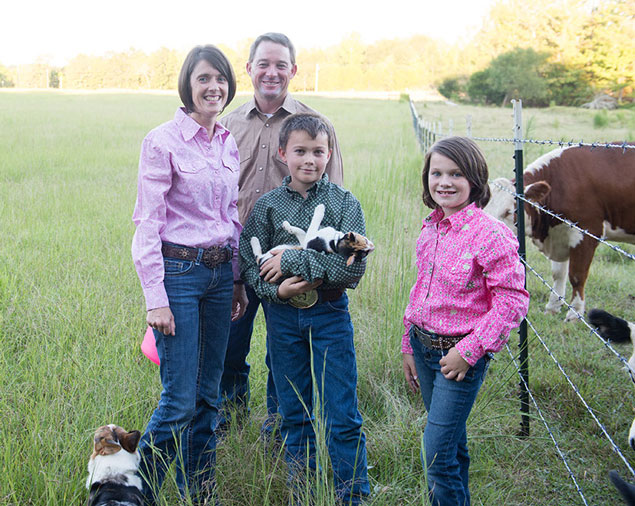In her 16 years as a Mississippi Extension agent focused on agricultural education, Julie White has heard it all. Cotton comes from sheep. Pigs lay eggs. Brown cows produce chocolate milk. And where does paper come from? Even her adult audiences don’t always have the right answers.

Photo by Megan Bean
Julie White, left, with her husband, William, and children Matthew and Morgan on their Oktoc, Miss., farm.
Raised on a small cattle farm in Denham Springs, La., White credits the adults in her life early on with fostering her desire to teach others about agriculture.
“Growing up, I was involved in 4-H, which is where I gained my love for agriculture,” says White, a Mississippi Land Bank customer since 2004. “I had Extension agents and parents that poured a lot into me, teaching me the value of what agriculture was doing for me. That instilled in me a passion for teaching, and when it came time to pick a career, I knew I wanted to work for Extension.”
Hands-On Program for Kids
With an agricultural education degree in hand from Louisiana State University, she joined Mississippi State University in 2000, where her husband, William, also works.
“As a county Extension agent, I was surprised to see the number of kids and adults who had no clue where their food and clothes come from,” says White, who responded four years ago by creating an agricultural education program called FARMtastic. The hands-on program gives elementary students an opportunity to interact with farmers, see farm animals up close, and learn about various crops, forestry and livestock.
What began as a county program in Starkville, Miss., soon took to the road. Last year alone, White and her FARMtastic colleagues reached nearly 6,000 students in second through fourth grades across the state.
“It doesn’t matter if the kids are in an urban or rural area, it is amazing to see the light bulb that comes on when they hold a baby chick,” she says. “I feed off of the fact that they are having those light-bulb moments.”
In addition to their full-time jobs, she and William do custom hay baling and run a small cow-calf farm with his parents in Oktoc, Miss., with plenty of involvement from their own children, Matthew, 11, and Morgan, 9, both active 4-Hers.
"It doesn’t matter if the kids are in an urban or rural area, it is amazing to see the light bulb that comes on when they hold a baby chick."
– Julie White
In 2015, the busy mom, farm operator and professional educator became the first Mississippian selected to participate in the American Farm Bureau Federation’s prestigious two-year Partners in Agricultural Leadership (PAL) class. After a rigorous selection process, White was one of 10 individuals nationwide chosen for the PAL program, underwritten in part by Farm Credit. The training sessions took her to New York City to study media relations; Washington, D.C., to learn about ag policy and the legislative process; Brazil to study international agriculture; and most recently, Honolulu, where she learned strategies for promoting agriculture by engaging with the public.
Teaching by Storytelling
“As agriculturalists, we need to be telling our story more,” says White. But she acknowledges that doing so doesn’t come naturally for some. “The easiest way to get started is with kids. Get involved in your local agricultural organizations, and help them teach kids. Kids like stories; tell them what you are doing on your farm.
“Another easy way to get involved is to use social media,” she says.
She suggests, for example, posting pictures of current farm activities, accompanied by short blurbs about what you are doing and why. Use simple words without farm jargon.
“It just takes practice to tell the story,” she notes. “It’s your story, and nobody knows your story but you.”